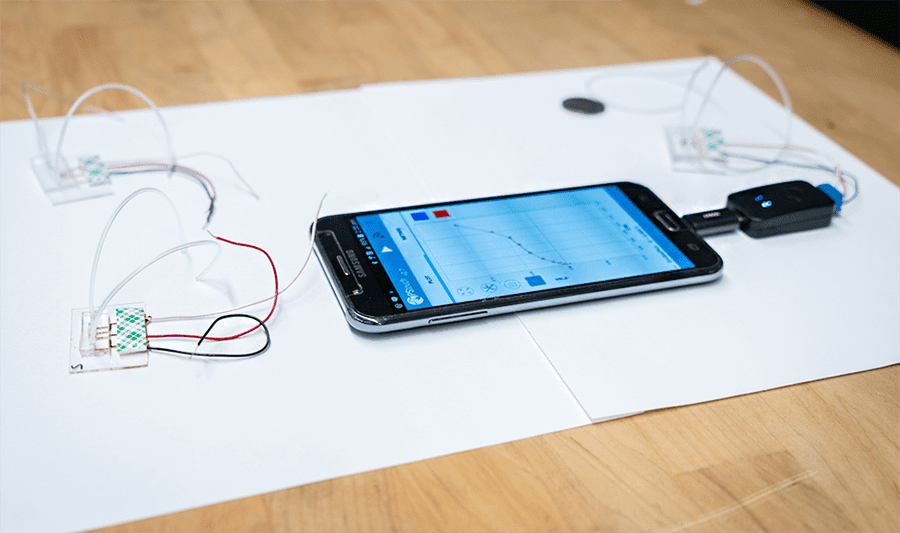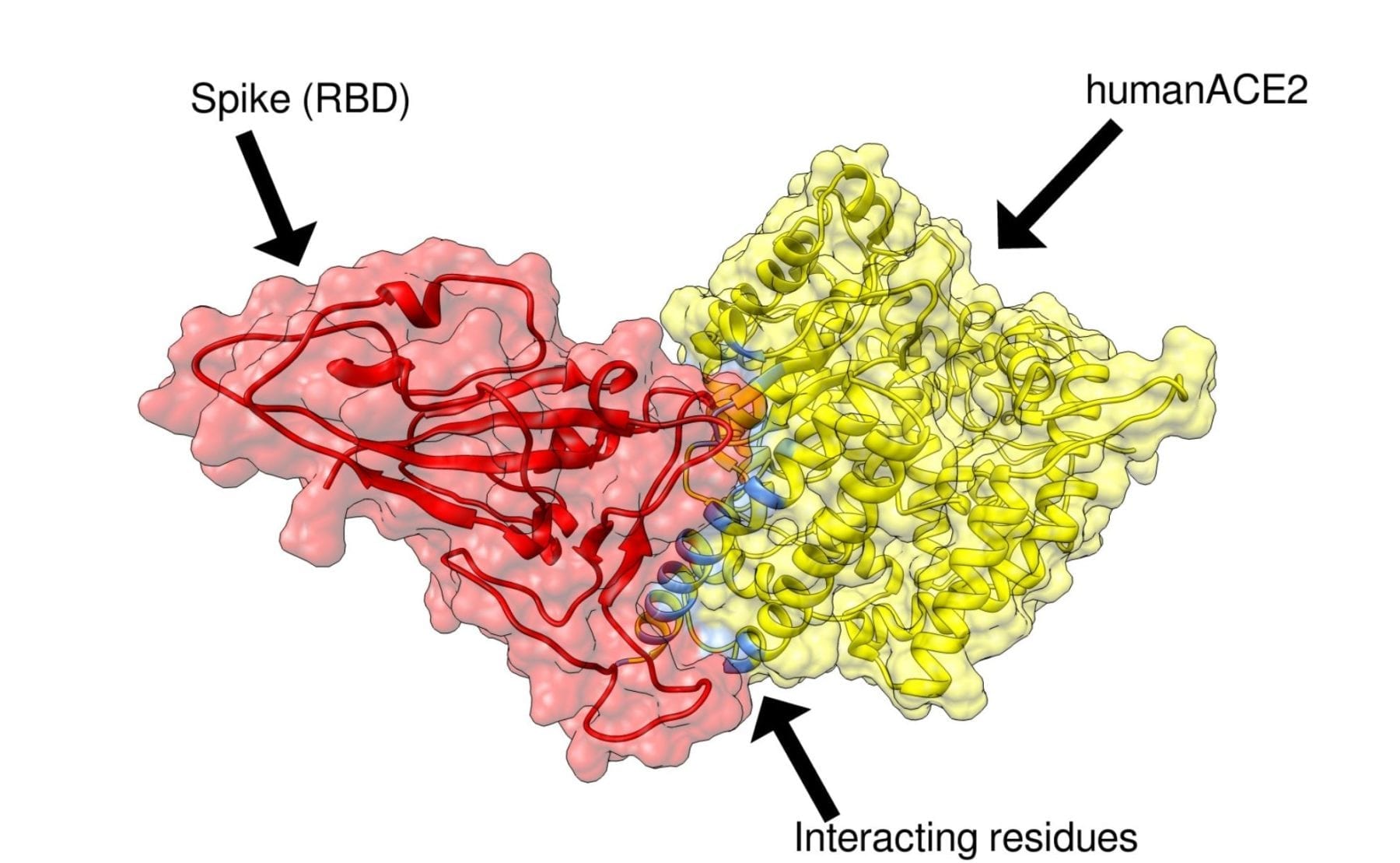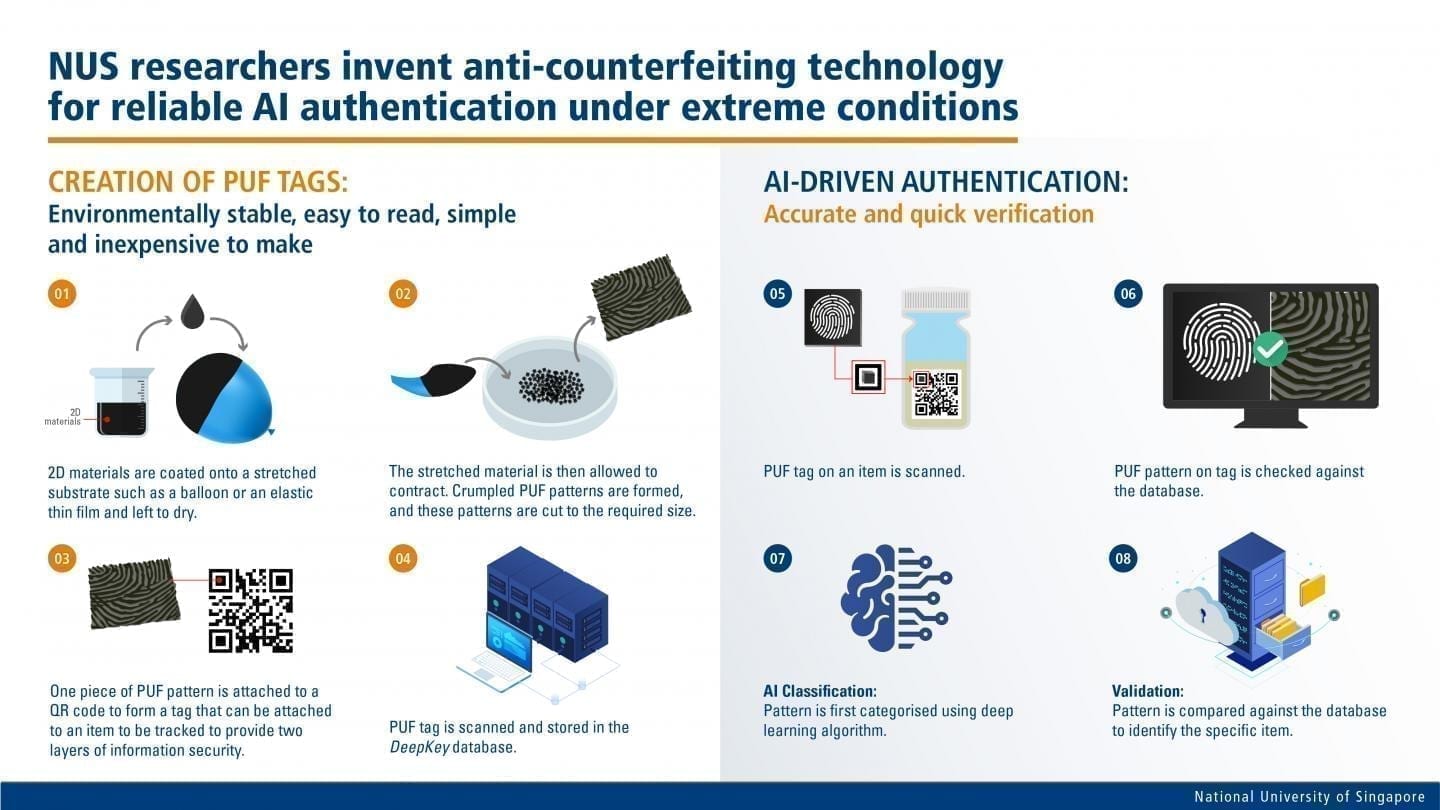
via Carnegie Mellon University
Carnegie Mellon University researchers reveal fastest known COVID-19 antibody test with high sensitivity due to a unique, 3D printing technology and an electrochemical reaction.
Researchers at Carnegie Mellon University, in collaboration with the University of Pittsburgh and UPMC, have developed one of the fastest known COVID-19 antibody tests. The test results are available in 10 to 15 seconds and detect the presence of two of the antibodies to SARS-CoV-2, the virus responsible for COVID-19. Such a quick and effective test could be a game-changer for controlling the spread of the pandemic.
The breakthrough test would require a very small drop of blood from a fingertip (less than five microliters) to identify two antibodies of the virus: spike S1 protein and receptor binding domain (RBD). It can detect antibody concentrations at an extremely low level, one picomolar (0.15 nanograms per milliliter), through an electrochemical reaction within a handheld microfluidic device. Results are sent almost immediately to a simple interface on a smart phone. The device can be cleaned (i.e. regenerated) within one minute using a special chemistry discovered by the researchers that allows multiple, successive readings from the same device.
A simple yet elegant additive manufacturing technology called aerosol jet 3D printing is responsible for the efficiency and accuracy of this testing device. Tiny, inexpensive gold micropillar electrodes are printed at nanoscale using aerosol droplets that are thermally sintered together. This causes a rough, irregular surface that provides increased surface area of the micropillars and an enhanced electrochemical reaction, where antibodies can latch on to antigens coated on the electrode. The specific geometry allows the micropillars to load more proteins for detection, resulting in very accurate, quick results.
“This sensing platform can also be used to detect other infectious diseases, potentially affecting the course of pandemics.”
RAHUL PANAT, ASSOCIATE PROFESSOR, DEPARTMENT OF MECHANICAL ENGINEERING
The test has a very low error rate since the binding reaction between the antibody and antigen used in the device is highly selective. This natural design was exploited by the researchers to their advantage.
The device, which has a provisional patent, is inexpensive to make (in the tens of dollars). And, the manufacturing capabilities already exist.
“My research team was working on 3D printed high-performance sensors to detect dopamine, a chemical in brain, when we realized that we could adapt our work for COVID-19 testing,” said?Rahul Panat, an associate professor of mechanical engineering at Carnegie Mellon who uses specialized additive manufacturing techniques for research ranging from brain-computer interfaces to biomonitoring devices. “We shifted our research to apply our expertise to combatting this devastating pandemic.”
Knowing the work would require a multidisciplinary approach, Panat collaborated with Shou-Jiang Gao, leader of the Cancer Virology Program at UPMC Hillman Cancer Center and professor of microbiology and molecular genetics at the University of Pittsburgh. Azahar Ali, a postdoctoral researcher in Panat’s Advanced Manufacturing and Materials Lab, was the lead author of the study. Their research findings are available on MedRxiv in anticipation of peer review.
“We’re sharing these results at the time of preprint and prior to peer review because of the significant, potential impact on public health,” said Panat.
This sensing platform can also be used for the detection of other infectious diseases.
The Latest Updates from Bing News & Google News
Go deeper with Bing News on:
COVID-19 Antibody Test
- Nanotubes, nanoparticles, and antibodies detect tiny amounts of fentanyl
A research team has developed a fentanyl sensor that is six orders of magnitude more sensitive than any electrochemical sensor for the drug reported in the past five years. The portable sensor can ...
- In effort to prevent rabies, CDC tightens rules for bringing dogs into U.S.
The Centers for Disease Control and Prevention is tightening its rules on dog importation to the United States with new requirements going into effect Aug. 1, in an effort to prevent rabies.
- New FLiRT COVID Variants Take Over U.S.
KP.2 is a member of a group of variants called FliRT (which is short for the technical names of their mutations). Recent CDC reporting shows that another FliRT variant, KP.1.1, has also been gaining ...
- AstraZeneca pulls COVID-19 vaccine from global markets
British-Swedish drug maker AstaZeneca is pulling its Vaxzevria COVID-19 vaccine from sale globally. The company has admitted it could cause rare blood clots, but said the vaccine was pulled for ...
- New 'FLiRT' COVID-19 Variants Are Spreading: All About Symptoms, Treatment, And How To Protect Yourself
Those who are more vulnerable to getting sick during a spring or summer surge may benefit from the new monoclonal antibody Pemgarda, a new treatment that was granted emergency use by the FDA in March, ...
Go deeper with Google Headlines on:
COVID-19 Antibody Test
[google_news title=”” keyword=”COVID-19 Antibody Test” num_posts=”5″ blurb_length=”0″ show_thumb=”left”]
Go deeper with Bing News on:
COVID-19 Test
- COVID-19 travel advice
A coronavirus disease 2019 (COVID-19) vaccine can prevent you from getting COVID-19 or from becoming seriously ill due to COVID-19. But even if you're vaccinated, it's still a good idea to take precautions to protect yourself and others while traveling during the COVID-19 pandemic.
- After fall in demand for COVID-19 tests, San Diego’s QuidelOrtho to lay off 500 workers
QuidelOrtho's new CEO started this week and joined investors during the local diagnostic company's first-quarter earnings call
- How to Perform the Motility Test
This microlearning focuses on the laboratory technique known as the Motility Test, which is commonly used to differentiate between bacterial species by detecting if a bacterium is motile due to the presence of flagella.
- iHealth’s COVID-19/Flu rapid test secures FDA EUA
iHealth CEO Jack Feng said: “In the face of uncertainty surrounding symptoms such as fever, sneezing, cough, or fatigue and what illness they may be indicative of, our at-home 3-in-1 self-test offers peace of mind for parents who might be worried that their vulnerable young children have Covid-19 or the flu.
- Here’s How Long the CDC Says to Isolate if You Test Positive for COVID in 2024
And while the virus continues to pop up (like the latest FLiRT COVID variants), the Centers for Disease Control and Prevention (CDC) has changed its COVID-19 protocol recommendations for 2024, updating them to reflect the changing severity and transmission of the virus.
Go deeper with Google Headlines on:
COVID-19 Test
[google_news title=”” keyword=”COVID-19 Test” num_posts=”5″ blurb_length=”0″ show_thumb=”left”]










